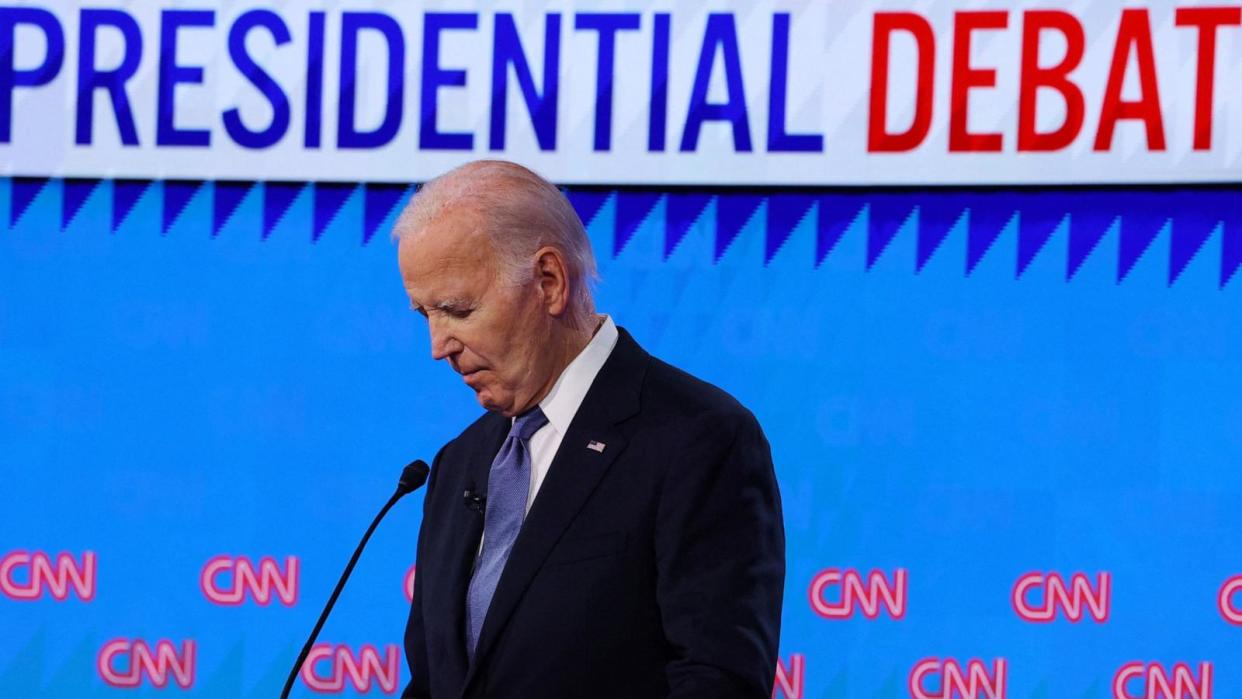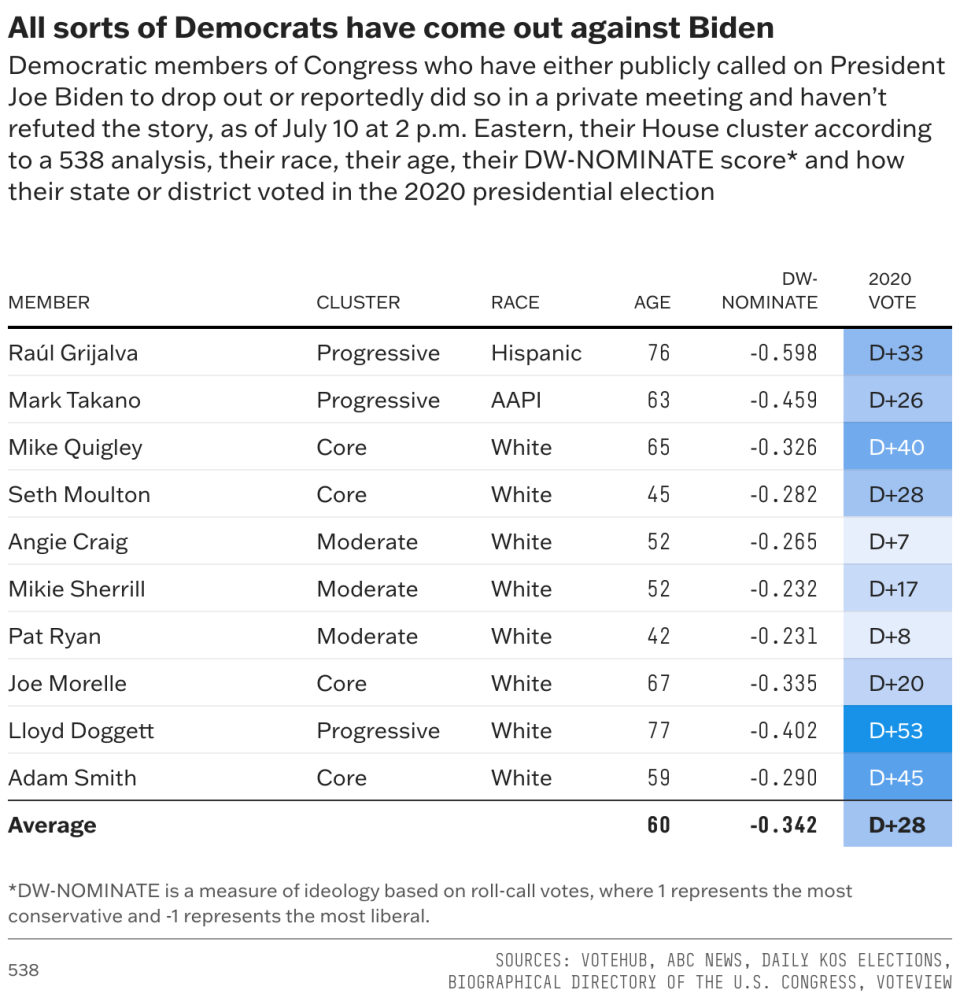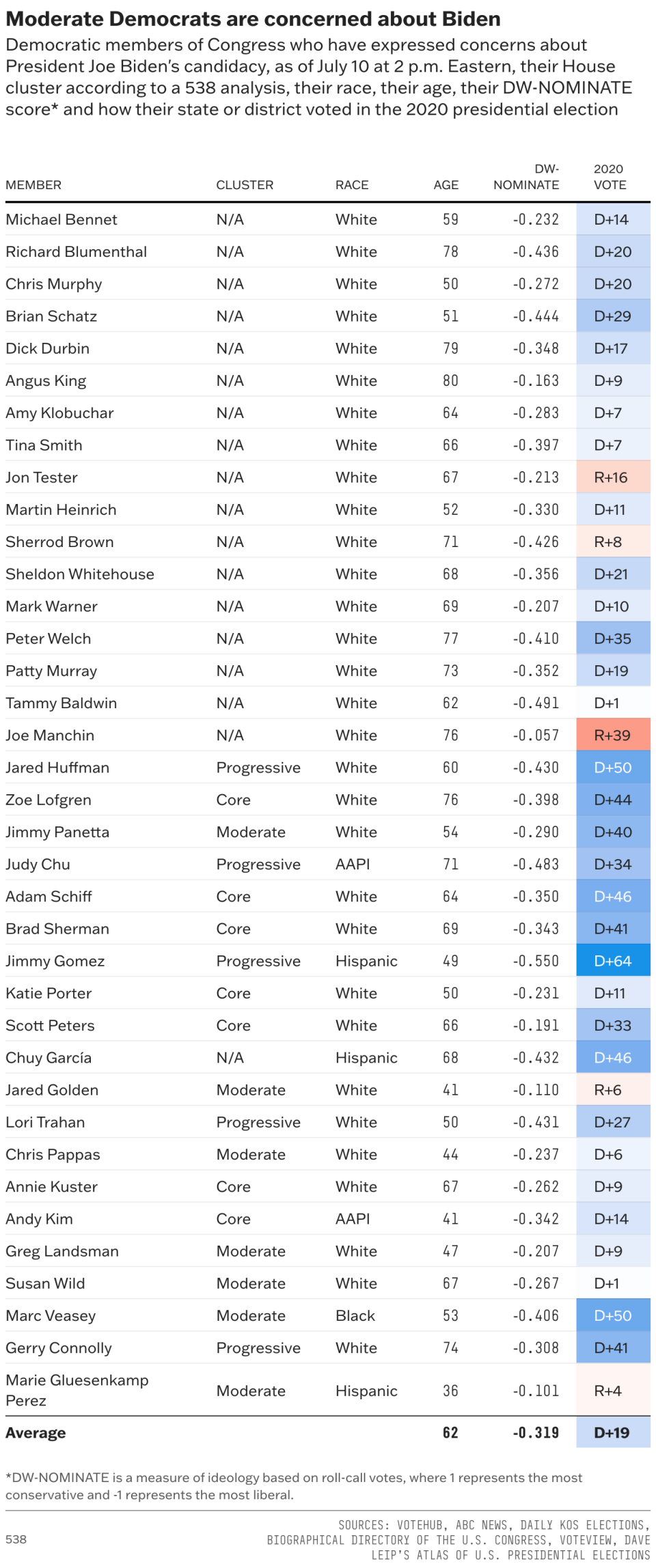What the Democrats doubting Biden have in common

President Joe Biden's debate performance last month was so bad it sparked a drastic reaction: calls for him to drop out of the presidential race in favor of a Democrat better equipped to defeat former President Donald Trump. In an extraordinary development, as of Wednesday at 2 p.m. Eastern, 10 Democratic members of Congress have either publicly called on Biden to drop out or reportedly did so in a private meeting and haven't refuted the story. Another 37 have expressed concerns about Biden as the nominee but stopped short of saying he should drop out. (These numbers are based on VoteHub's excellent tracker of Democrats' stances on Biden, supplemented by reporting from ABC News.)
However, even more Democratic members of Congress have rallied to Biden's side. Since the debate, 89 have made public statements saying they still support Biden as the nominee — most of them in the last few days. The rush of support has been a godsend for Biden as he attempts to save his candidacy. The question of whether he will step aside is likely to continue to dog the president, with Democrats seemingly in disagreement over the best way forward, but for now it appears Biden has every intention of staying in this race.
So which Democrats are speaking out on this issue and why? At first blush, there may not seem to be much of a pattern in who is calling on Biden to step down and who is standing by his side. But a closer look reveals there are some similarities within these two groups, which may help explain why Biden is hanging on for now.
The Democrats who have explicitly called on Biden to step aside are an eclectic bunch. They actually hail from all three clusters of the party, as defined by an analysis 538 conducted in May: three Progressive Democrats, four Core Democrats and three Moderate Democrats. They range in age from 42 (Rep. Pat Ryan) to 77 (Rep. Lloyd Doggett). Most hail from safe Democratic seats, but two (Ryan and Rep. Angie Craig) are vulnerable for reelection. And most are white, but one (Rep. Raúl Grijalva) is Hispanic and one (Rep. Mark Takano) is Asian American.

However, if we include Democrats who have merely expressed concerns about Biden's candidacy, a clearer pattern emerges. This group is significantly more moderate than the Democratic caucus as a whole; their average DW-NOMINATE score is -0.319. (DW-NOMINATE is a measure of ideology based on roll-call votes, where 1 represents the most conservative and -1 represents the most liberal. The average Democratic member of Congress has a DW-NOMINATE score of -0.376.)
Biden doubters also hail disproportionately from swing states or districts. Thirteen out of 37 represent places that Biden lost in 2020 or won by fewer than 10 percentage points. This makes sense when you think about it: The reelection of representatives like Rep. Susan Wild could hinge on how well the Democratic presidential nominee does in their districts, and they may fear that Biden will drag them down with him if he loses big. And for others on this list, such as Sen. Jon Tester, expressing concerns about Biden's age could be part of an overall strategy to distance themselves from a president who will probably lose in their home constituency.

By contrast, pore over the list of the Democrats who stand with Biden. They are relatively progressive, with an average DW-NOMINATE score of -0.415. (In fact, none of them hail from the 538-defined Moderate Democrats cluster of the party.) Their states and districts, on average, voted for Biden in 2020 by 36 points; in other words, most of these members are more at risk from a primary challenge than from losing a general election. (Indeed, the fear of facing a pro-Biden challenger may be part of what kept them in line.) And, perhaps most importantly, they are much more racially diverse: only 38 percent white. (Interestingly, though, they're not significantly older than anti-Biden or Biden-skeptical Democrats, so apparently this isn't a generational divide.)

For now, this list also includes the most powerful Democratic legislators in the country: Senate Majority Leader Chuck Schumer, House Minority Leader Hakeem Jeffries, House Minority Whip Katherine Clark and House Democratic Caucus Chair Pete Aguilar.* Their opinions obviously carry more weight in Democratic politics than those of any of the people calling for Biden's withdrawal.
Moreover, 37 Black senators and representatives have come out in support of Biden, making them a core part of his base of support. (By contrast, only one Black Democrat, Rep. Marc Veasey, has so much as expressed concerns about Biden's candidacy.) This mirrors Biden's historical support among Black voters: In many ways, they were responsible for delivering the Democratic nomination to Biden in 2020 when he won the South Carolina primary after poor finishes in Iowa, New Hampshire and Nevada. So if Biden survives this political scare, he may once again have the support of the Black community to thank.
To be sure, it would be a political crisis for Biden to have even one elected Democrat saying he should drop out, let alone 10. Voters pay attention to elite opinions. But the weight of 10 — or 47, if you count those with concerns — dissenters is still not necessarily enough to force him from the race. For proof of this, look no further than the 2016 presidential campaign, when at least 24 Republican representatives and 15 Republican senators called on Trump to drop out, asked him to reconsider his candidacy or said they would not support him after the "Access Hollywood" tape surfaced. Trump obviously not only stayed in that race — he won.
Biden is certainly not guaranteed that happy of an ending (although his chances of winning the election, even after that debate performance, are hardly zero). But the quality and quantity of Democrats staying in his corner will make it easier for him to at least stay in the race.
Footnotes
*Former Speaker Nancy Pelosi was on this list too, until Wednesday morning, when she said, "It's up to the president to decide if he is going to run. We are all encouraging him to make that decision, because time is running short." That implies that she'll back whatever Biden decides to do, but it also implies she doesn't accept his insistence that he's not dropping out as the final word.
What the Democrats doubting Biden have in common originally appeared on abcnews.go.com

 Yahoo News
Yahoo News 
